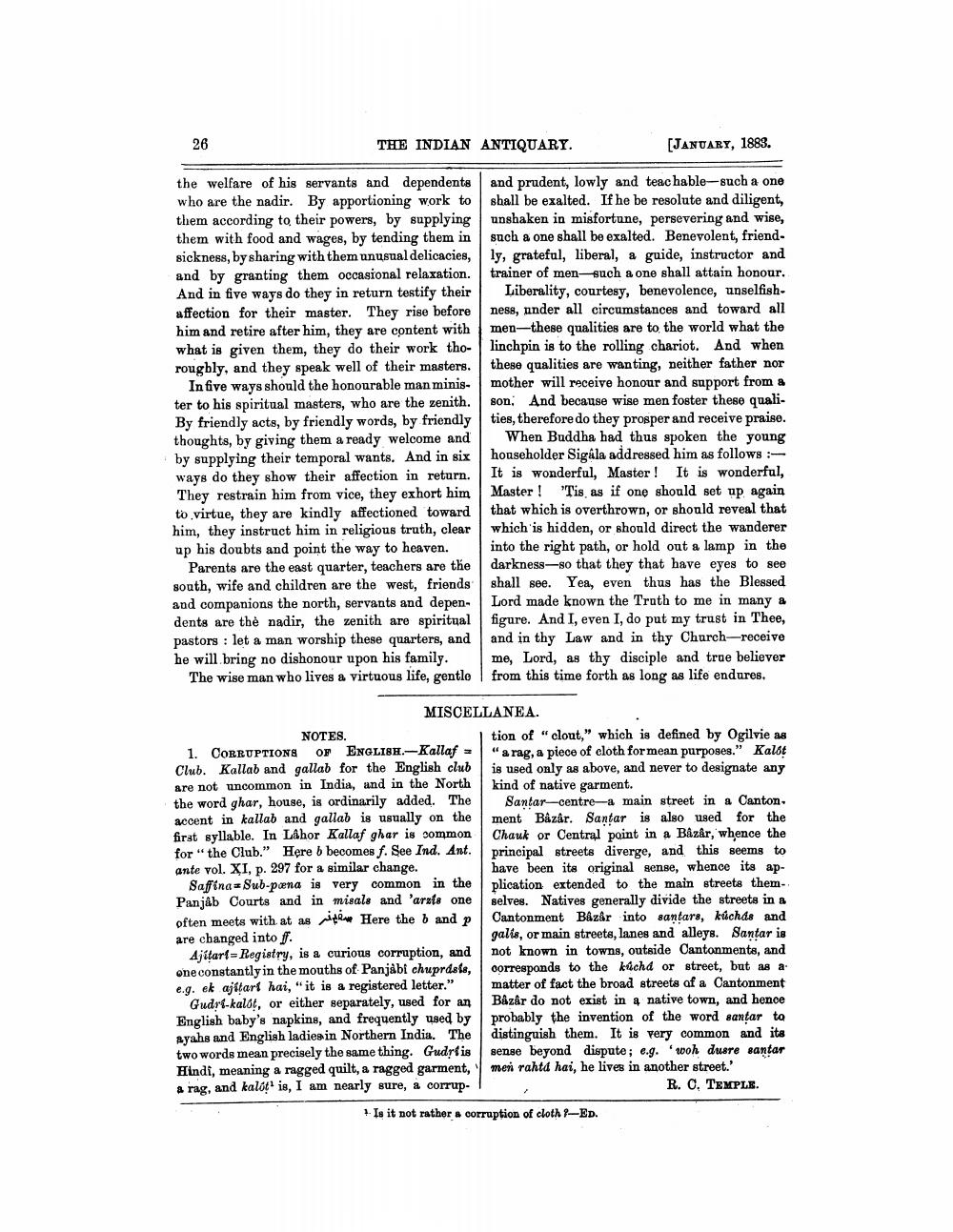________________
26
THE INDIAN ANTIQUARY.
[JANUARY, 1883.
the welfare of his servants and dependents and prudent, lowly and teachable-such a one who are the nadir. By apportioning work to shall be exalted. If he be resolute and diligent, them according to their powers, by supplying unshaken in misfortune, persevering and wise, them with food and wages, by tending them in such a one shall be exalted. Benevolent, friend. sickness, by sharing with them unusual delicacies, ly, grateful, liberal, a guide, instructor and and by granting them occasional relaxation. trainer of mensuch a one shall attain honour. And in five ways do they in return testify their | Liberality, courtesy, benevolence, unselfishaffection for their master. They rise before ness, under all circumstances and toward all him and retire after him, they are content with men-these qualities are to the world what the what is given them, they do their work tho- linchpin is to the rolling chariot. And when rougbly, and they speak well of their masters. these qualities are wanting, neither father nor
In five ways should the honourable man minis- mother will receive honour and support from a ter to his spiritual masters, who are the zenith. son And because wise men foster these qualiBy friendly acts, by friendly words, by friendly ties, therefore do they prosper and receive praise. thoughts, by giving them a ready welcome and When Buddha had thus spoken the young by supplying their temporal wants. And in six householder Sigála addressed him as follows: ways do they show their affection in return. It is wonderful, Master! It is wonderful, They restrain him from vice, they exhort him Master! 'Tis as if one should set up again to virtue, they are kindly affectioned toward that which is overthrown, or should reveal that him, they instruct him in religious truth, clear which is hidden, or should direct the wanderer up his doubts and point the way to heaven. into the right path, or hold out a lamp in the
Parents are the east quarter, teachers are the darkness--so that they that have eyes to see south, wife and children are the west, friends shall see. Yea, even thus has the Blessed and companions the north, servants and depenLord made known the Truth to me in many a dents are the nadir, the zenith are spiritual figure. And I, even I, do put my trust in Thee, pastors : let a man worship these quarters, and and in thy Law and in thy Church-receive he will bring no dishonour upon his family. I me, Lord, as thy disciple and true believer
The wise man who lives a virtuous life, gentle from this time forth as long as life endures.
MISCELLANEA. NOTES.
tion of "clout," which is defined by Ogilvie as 1. CORRUPTIONS OF ENGLISH-Kallaf -
"a rag, a piece of cloth for mean purposes." Kalot Club. Kallab and gallab for the English club is used only as above, and never to designate any are not uncommon in India, and in the North
kind of native garment. the word ghar, house, is ordinarily added. The Santar-centre-a main street in a Canton, accent in kallab and gallab is usually on the ment Bâzâr. Santar is also used for the first syllable. In Lahor Kallaf ghar is sommon Chauk or Central point in a Bazar, whence the for the Club." Here b becomes f. See Ind. Ant. principal streets diverge, and this seems to ante vol. XI, p. 297 for a similar change.
have been its original sense, whence its apSafinaz Sub-pæna is very common in the plication extended to the main streets them Panjab Courts and in misals and 'arzis one selves. Natives generally divide the streets in a often meets with at as the Here the b and p Cantonment Bâzâr into santars, kúchds and are changed into f.
galls, or main streets, lanes and alleys. Santar is Ajitart=Registry, is a curious corruption, and not known in towns, outside Cantonments, and one constantly in the mouths of Panjabi chuprdels, corresponds to the küchd or street, but as a e.g. ek ajstarf hai," it is a registered letter." matter of fact the broad streets of a Cantonment
Gudyi-kalót, or either separately, used for an Bazar do not exist in a native town, and hence English baby's napkins, and frequently used by probably the invention of the word santar to ayahs and English ladies in Northern India. The distinguish them. It is very common and its two words mean precisely the same thing. Gudrfis sense beyond dispute; e.g. 'woh dusre santar Hindi, meaning a ragged quilt, a ragged garment, men rahta hai, he lives in another street.' a rag, and kalót is, I am nearly sure, a corrup
R. O. TEMPLE. - Is it not rather s corruption of cloth –Ed.




